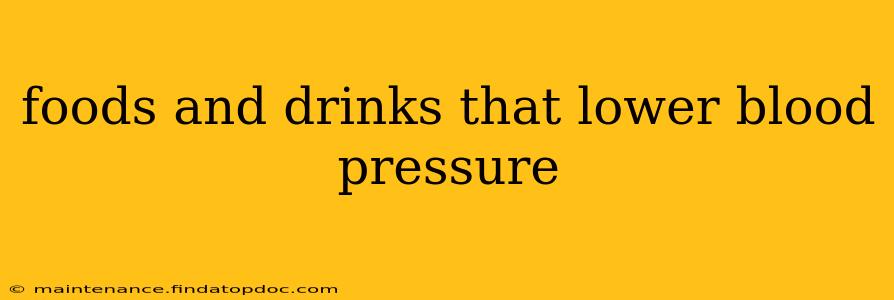High blood pressure, or hypertension, is a serious health concern affecting millions worldwide. While medication is often necessary for managing severe hypertension, dietary changes can significantly contribute to lowering blood pressure naturally and improving overall cardiovascular health. This comprehensive guide explores foods and drinks scientifically proven to help reduce blood pressure, answering common questions along the way.
What foods should I eat to lower blood pressure?
The cornerstone of a blood pressure-lowering diet is incorporating foods rich in potassium, magnesium, calcium, and fiber, while limiting sodium intake. Here's a breakdown of key food groups:
-
Fruits and Vegetables: These are packed with potassium, a mineral that helps counter the effects of sodium. Bananas, apricots, spinach, sweet potatoes, and tomatoes are excellent choices. Aim for at least five servings a day.
-
Whole Grains: Oats, barley, brown rice, and quinoa are rich in fiber, which helps regulate blood pressure by reducing cholesterol and improving blood sugar control.
-
Lean Protein: Fish, particularly fatty fish like salmon and tuna, are rich in omega-3 fatty acids, known for their anti-inflammatory properties and blood pressure-lowering effects. Chicken and beans are also healthy protein sources.
-
Dairy Products (Low-Fat): Dairy provides calcium, crucial for maintaining healthy blood pressure. Opt for low-fat or fat-free options.
-
Nuts and Seeds: Almonds, walnuts, flaxseeds, and chia seeds are excellent sources of magnesium, fiber, and healthy fats that can contribute to lower blood pressure.
What drinks help lower blood pressure?
In addition to diet, hydration plays a vital role. Certain beverages can further support blood pressure management:
-
Water: Staying adequately hydrated is crucial for overall health and can help regulate blood pressure.
-
Beet Juice: Beets are rich in nitrates, which convert to nitric oxide in the body, helping to relax blood vessels and lower blood pressure. Numerous studies support the blood pressure-lowering effects of beet juice.
-
Hibiscus Tea: Studies suggest that hibiscus tea may help lower both systolic and diastolic blood pressure. Its rich antioxidant profile may contribute to its beneficial effects. However, more research is needed to confirm these findings conclusively.
Does drinking alcohol affect blood pressure?
Moderate alcohol consumption (one drink per day for women, two for men) has been linked to a slightly lower risk of heart disease in some studies. However, it's crucial to emphasize that excessive alcohol intake significantly raises blood pressure and poses numerous health risks. If you choose to drink, do so in moderation and consult your doctor.
What is the DASH diet?
The Dietary Approaches to Stop Hypertension (DASH) diet is a well-researched dietary pattern specifically designed to lower blood pressure. It emphasizes fruits, vegetables, whole grains, lean protein, and low-fat dairy, while limiting saturated and trans fats, cholesterol, and sodium. The DASH diet has consistently shown significant effectiveness in reducing blood pressure.
How long does it take to see results from dietary changes?
The timeframe for seeing noticeable changes in blood pressure varies from person to person. Some individuals may experience a reduction in blood pressure within weeks of adopting a healthier diet, while others may require several months. Consistency is key; continued adherence to a blood pressure-lowering diet is essential for long-term benefits.
Are there any foods I should avoid to lower my blood pressure?
Processed foods, red meat, sugary drinks, and foods high in sodium should be limited or avoided. These often contribute to weight gain and inflammation, both of which can negatively impact blood pressure. Reducing sodium intake is particularly important, as excess sodium causes fluid retention, increasing blood volume and pressure.
Conclusion
Adopting a heart-healthy diet rich in fruits, vegetables, whole grains, and lean protein, while limiting sodium and processed foods, is a crucial step in managing blood pressure naturally. Remember to consult your doctor or a registered dietitian for personalized dietary advice, especially if you have pre-existing health conditions. This information is for general knowledge and does not constitute medical advice. Always consult with a healthcare professional before making significant dietary changes.
